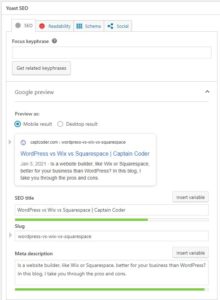Before I start this, I want to preface that there absolutely is a time and place for website builder options like Wix and Squarespace. Especially for those that are just getting started and need something online “now”, they can provide great options for brand new businesses to start creating their digital footprint.
However, while there are good things about both Wix and Squarespace, having worked in the industry for 15 years and been coding websites for 20, I also know there are some drawbacks to them as well.
Let’s take a deep dive this week into WordPress websites and how they stack up against website builders like Wix and SquareSpace.
Your Website is Your Foundation
One thing to keep in mind is that your website is the central hub for your marketing. Your ads, organic social media, email marketing, content marketing, everything will likely lead back to your website in some way.
Your website is also unique in that it is one of the few things that can be 100% owned by your company. You don’t have to let anything exist on your website that you do not want to; it’s all controlled by you.
Given these two big factors, your website needs to live somewhere that you don’t have to worry about whether or not the copyrights are yours, your data is secure, and will still be there even if one of your website service providers goes out of business.
While Wix and Squarespace (now) acknowledge that you and/or your company owns everything you upload to their services (it wasn’t always that way; there was a time where you surrendered rights over to them), your website 100% lives within their ecosystem. That means if those companies went out of business tomorrow, there goes your website.
That may not seem like an immediate issue, but it’s a real one. Squarespace has a reputation to be more moveable outside of its ecosystem, but both website builders work best within their own platforms. Not being able to move a website that you spent long hours creating to another host can put you at the mercy of a third-party company, and that is kind of the opposite of that whole “you own it” thing with your website.
Instead, through WordPress.org self-hosted options, you’re able to access a ton of technology without the same level of dependency. If WordPress went out of business tomorrow, its technology would still work for years, giving you plenty of time to switch up your website’s codebase. Plus, with WordPress.org, you can switch your website hosting provider per your website’s needs.
WordPress Can be Just as Cost-Effective
While both Wix and SquareSpace start at around $18/month (the versions you’ll need for running a business website), many high-quality WordPress hosting platforms can run anywhere from $10/month up to $30/month and more. Bluehost, for instance, starts around $8/month for a single WordPress website. Once you’ve outgrown their platform, want more speed and power, or maybe are looking for the best customer service for a non-technical person, website plans with WPEngine start at around $30/month. (This is my personal favorite) So while you might pay slightly more for a really good WordPress host, your customer support, site speed, and power also increases.
Your Choices Are Limited by the Platforms
This is true for all 3 to some extent, but especially true with Wix and Squarespace. All 3 of these platforms were built to make website creation easy and more cost-effective. With that comes specific limitations. There are only so many templates to choose from, especially on website builders like Wix and Squarespace. Your beautiful website that you built for your business might look eerily similar to a competitor’s if you’re both using Squarespace.
While website design definitely has its trends and common looks, WordPress is an open source platform, meaning thousands of developers across the world contribute themes, plugins, and more to the platform. This increases your options tenfold because you also have the ability to customize further through direct code edits which you (maddingly) can’t do with Wix or Squarespace.
Another advantage to WordPress? You can always have a WordPress professional custom-code a website for you. That means your website can be completely unique to you and your company, but still have the same power and functionality of WordPress you’ve become accustomed to.
Wix uses Adaptive, Not Responsive
Let me explain this slightly jibberish headline. When you’re building a website, you want it to work well on a laptop or desktop as well as a phone and tablet. Squarespace claims to build all their themes responsively, which means that it responds to the browser and the size of the screen (something Google prefers and recommends).
I’ve noticed that Wix, however, uses a slightly dated approach by using adaptive technology. Easily put, that means that Wix lets you create a desktop version of the site and then edit/create a mobile version, with potentially different blocks and content (not something I’d recommend). This can be frustrating, as it means you might need to change something twice for it to appear on the desktop and mobile version of the website.
If you’re looking into WordPress and themes for it, make sure you choose one that touts its code as responsive and you’ll be good to go. The goal is to minimize your workload, so you definitely don’t want to have to worry about making changes on multiple versions of a website.
WordPress is Better Built for SEO
I’ve seen some arguments for Squarespace and Wix and their improved SEO experiences. However, most of their SEO tools, like editing meta descriptions and titles, are pretty buried and absolutely not intuitive to find (believe me, my office has heard the cursing as I’ve tried to find them for clients). If it’s buried, that means your average user just isn’t going to take advantage of it. On-page SEO is important because it improves your discoverability of your website, improves click-throughs from Google and search engine listing pages, and helps to optimize any backlinks that are created in an external SEO strategy.
 WordPress was originally created to be the blogging platform, and it shows. Blogging is one of the best ways to improve your SEO and create fresh content that Google and your readers love, so the fact that WordPress handles this the best is a huge plus for your SEO. WordPress inherently comes with some pretty powerful SEO features, including some of the best built-in URL structure I’ve seen in any website creation platform (don’t get me started on Shopify’s).
WordPress was originally created to be the blogging platform, and it shows. Blogging is one of the best ways to improve your SEO and create fresh content that Google and your readers love, so the fact that WordPress handles this the best is a huge plus for your SEO. WordPress inherently comes with some pretty powerful SEO features, including some of the best built-in URL structure I’ve seen in any website creation platform (don’t get me started on Shopify’s).
But taking the lead here, WordPress also lets you add plugins to help supercharge your website, and there’s no better SEO plugin than Yoast. Even the free version helps your website do some pretty amazing things, giving you tips to improve your posts and pages. My personal favorite is how much control I have over what Google indexes and how easy it is to create the vital meta titles & descriptions that Google shows to its searchers (and thus, what encourages your searchers to click on your link versus a competitor).
Want Website Longevity? WordPress Wins.
Look, it’s easy to see that I love WordPress. Hopefully it’s easy to see why, based on just the 4 reasons above. However, the most important to me is that all of these things combined means that WordPress also provides the most flexibility for your business’s growth. You may have a larger investment upfront in a customized WordPress website, but that flexibility helps to protect your investment for a much longer term because your website on WordPress can grow more easily with you.
WordPress is also easier to adjust and move around, as needed. You can rest assured that you own your website, versus being dependent on a third-party company and its limitations. And WordPress’s open-source approach means you can add powerful features, like eCommerce solutions, without costing you an arm and a leg in monthly service fees like you can see on Wix and Squarespace or even Shopify. (I once cost-compared a WordPress with Woocommerce website with a ton of features to Shopify…the client would pay 1/3 per month with Woocommerce vs. Shopify’s fees).
If you’re just starting and need a footprint that you can create yourself – and have the time to invest in it – than Wix and Squarespace might just be right for you. But if you’re looking for a website that will last and be a powerful sales tool, WordPress is always the way to grow. It just depends on where you business is now and where you want to be in a year, two, or five.



